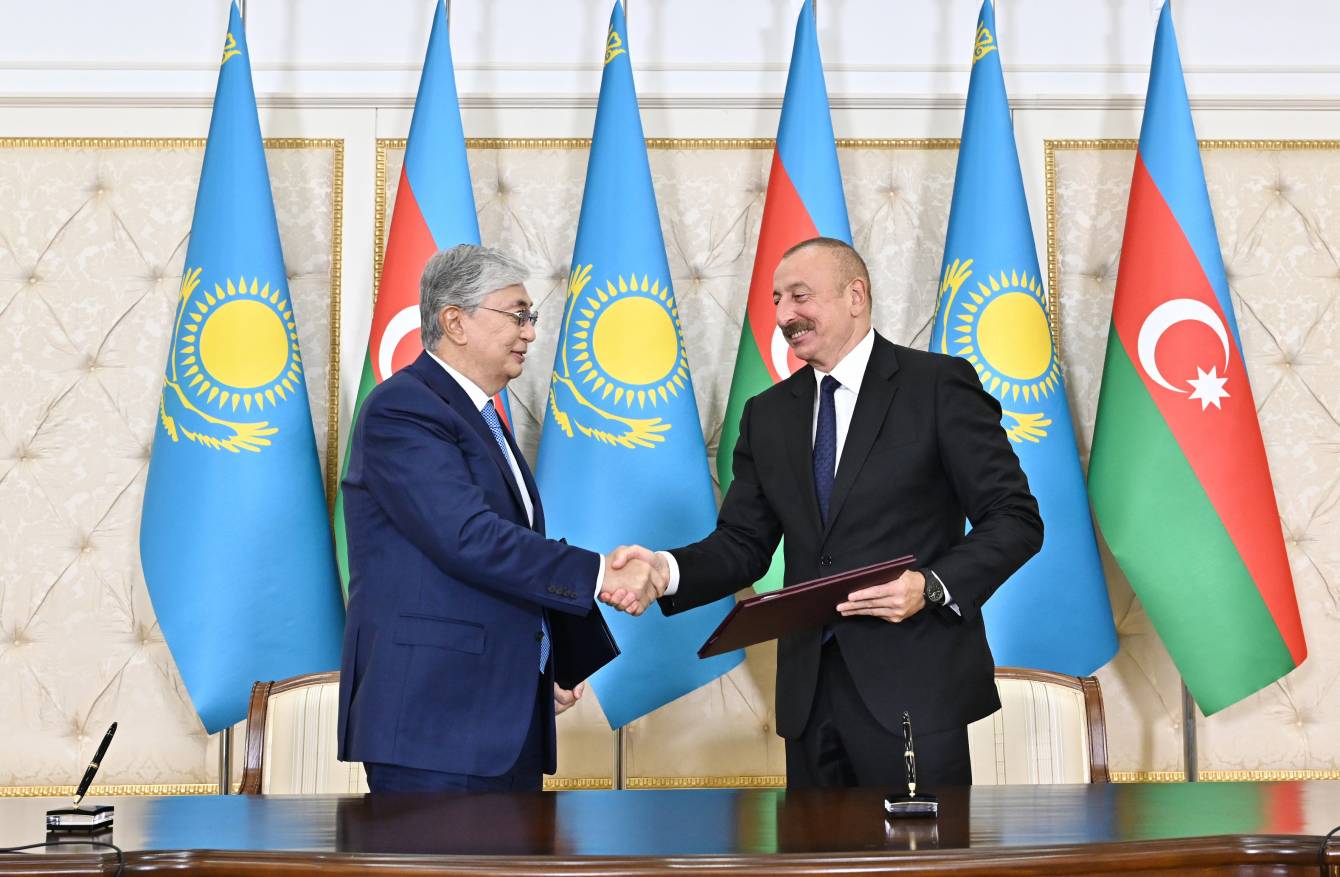Azerbaijan and Kazakhstan agreed to take bilateral relations to the next level during Kazakh President Kassym-Jomart Tokayev’s recent visit to Baku.
During the one-day visit, several documents were signed with the aim of boosting Kazakh-Azerbaijani relations, which have reached the 30-year mark since establishing diplomatic relations between the countries.
President Aliyev and his Kazakh counterpart signed two strategic cooperation deals, as well as eleven Memoranda of Understanding (MoU), one protocol, three agreements, and one cooperation plan, which were inked by leading state institutions and companies from the two countries in the fields of transport, energy, trade, railway, aerospace, digital development and others.
Signed by both presidents, the “Comprehensive Program on the Development of Cooperation between the Republic of Azerbaijan and the Republic of Kazakhstan for 2022-2026” was the biggest joint initiative aimed at cementing the mutual relationship in multiple sectors.
“During our conversations and discussions today, we also touched upon the issue of increasing the trade turnover. In my opinion, our focus on priority directions of mutual activity within the field of transportation and logistics will allow us to carry out more export-import operations,” President Aliyev said following the signing of the documents.
“I believe that there is tremendous potential there. I think the President of Kazakhstan announced the figure we aim for – a turnover worth 1 billion dollars. In my opinion, taking into account the intention of both sides to deepen cooperation, this is quite realistic.”
The key focus of the countries' cooperation in transportation and logistics is leveraging the Middle Corridor and integrating the Zangazur multi-modal route into it. Realization of the corridor’s full potential is expected to contribute to increasing the bilateral trade turnover, which reached $194 million in the first half of 2022. Trade turnover is forecast to hit $480 million by the end of this year.
In June, the foreign ministers of Azerbaijan, Kazakhstan and Türkiye agreed in Baku to reinforce cooperation efforts between the three countries and strengthen regional connectivity through already available and new agreements. They agreed to capitalize on the potential of the Trans-Caspian East-West Middle Corridor, which starts in Southeast Asia and China, runs through Kazakhstan, the Caspian Sea, Azerbaijan, Georgia, Türkiye and further to European countries.
The Trans-Caspian East-West Corridor, known shortly as the Middle Corridor, is crucial to reviving the ancient Silk Road. It traverses on rail and road routes across Georgia, Azerbaijan and the Caspian Sea and continues toward China on the Turkmenistan-Uzbekistan-Kyrgyzstan and Kazakhstan routes. The Baku International Sea Trade Port (Azerbaijan), Aktau/Kuryk ports (Kazakhstan) and Turkmenbashi port (Turkmenistan) are the main maritime chunks of the multimodal transport corridor. The Middle Corridor promises even bigger benefits to the landlocked countries in the region.
In one year, out of approximately 10 million containers that are transported from China to Europe, 96 percent utilizes sea routes and only the remaining 4 percent uses the Trans-Siberian Railway, which is also called the Northern Corridor. The Middle Corridor is more economical and faster compared to the Northern Corridor as a trade route between Europe and Asia and shrinks the travel distance by 2,000 kilometers.
The Middle Corridor also runs through more favorable climate conditions and shortens the travel time by 15 days compared to the sea route. Furthermore, the Middle Corridor offers great opportunities for cargo traffic in Asia so that the loads can reach the Middle East, North Africa and the Mediterranean region by integrating the port connections in Türkiye.
If used effectively, the Middle Corridor is expected to create important economic opportunities, enabling South Caucasian and Central Asian countries to benefit from China-Europe trade, which is valued at $600 billion annually. In particular, the establishment of logistical centers and free trade zones at the ports of Azerbaijan, Kazakhstan and Turkmenistan will facilitate the development and deepening of Trans-Caspian cooperation.
During the June meeting, Azerbaijan’s foreign minister voiced Baku’s intentions to give impetus to the Middle Corridor’s regional contributions through the Zangazur corridor. The corridor is currently being built in the liberated Azerbaijani lands.
Independent analysis suggests that the Zangazur corridor will not only restore the shortest connection between Azerbaijan’s mainland and its exclave of Nakhchivan but also form an important link in the East-West and North-South transport corridors that will also enable Türkiye to speed up its exports to Central Asia by a shorter route. The launch of the multi-modal corridor is said to benefit all regional countries and contribute to the Eurasian trade and transport communications that incorporate the regional economies with a nominal GDP of $1.1 trillion. The Central Asian exports will go on an uninterrupted overland route toward Türkiye and Europe when the corridor come online.







 Iran's senior military leaders described the drone and missile attack on Israel on April 14 night as “successful".
Iran's senior military leaders described the drone and missile attack on Israel on April 14 night as “successful".
 The number of evacuees from flooded areas in Kazakhstan has reached 97,852 people, including about 32,856 children since March 27.
The number of evacuees from flooded areas in Kazakhstan has reached 97,852 people, including about 32,856 children since March 27.
 Iranian President Ebrahim Raisi warned Israel that it would face a "real and extensive" response if it makes any "mistake" following Tehran’s missi...
Iranian President Ebrahim Raisi warned Israel that it would face a "real and extensive" response if it makes any "mistake" following Tehran’s missi...



